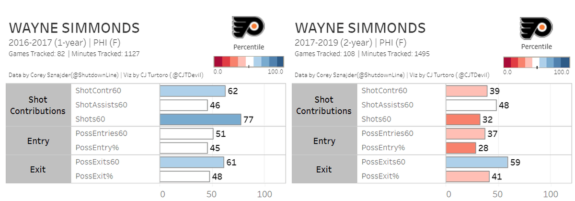New Jersey Devils general manager Ray Shero kicked off the free-agent signing period by inking 30-year old right winger Wayne Simmonds to a one-year, $5 million deal.
This was the first big move the Devils made since acquiring Simmonds’ former Nashville Predators teammate, P.K. Subban a week ago, and the first veteran forward brought into New Jersey this summer.
Here’s a break down of the acquisition.
The Pros of Signing Simmonds
The addition of Simmonds is a little puzzling. On the surface, an average annual value of $5 million might be a little steep for a player coming off a 30-point season, but on a one-year deal, the Devils aren’t taking on too much risk if things don’t pan out.
In a nutshell, it’s a ‘prove-it’ type contract for the former Philadelphia Flyer, who will turn 31 in August.
If all goes according to plan, he will provide the Devils with an upgrade in terms of net-front presence, especially on the power play. He’s scored at least 24 goals in each of his six full NHL seasons, and his 91 power-play goals since the 2011-12 season rank third among all current players.
Simmonds’ strong play on the man advantage can really benefit the Devils, who finished in the bottom third on the league last season in power play percentage with a conversion rate of just 17.7%.
Away from the scoresheet, Simmonds is widely regarded as the ultimate team player. As a matter of fact, the veteran forward was awarded the 2018-19 Messier Leadership Award, which recognizes an individual as a superior leader within their sport. After parting ways with a number of veterans like Brian Boyle, Ben Lovejoy, and Marcus Johansson, the young Devils’ locker room can certainly use another veteran presence like Simmonds.

He’s a tough two-way player who can adjust between being a power forward and an enforcer, which is a tremendous asset for young Devils players like Jack Hughes and Nico Hischier. Opponents will have to think twice before taking a run at any of the Devils young stars, which is something they certainly needed after trading away Boyle and losing out on Kurtis Gabriel, who signed a two-year, two-way deal with the rival Flyers on Monday.
Despite playing in such a physical role, Simmonds has also been incredibly durable over the course of his career. He’s never played in less than 75 games in a full season over the span of his 12-year career. Even in 2017-18, when he suffered a tear in his pelvic area, fractured his ankle, pulled a groin, busted open his mouth (twice) and tore a ligament in his thumb, he somehow found a way to miss only seven games.
The Cons of Signing Simmonds
On the flip side, Simmonds is coming off a down year in 2018-19. He matched a career-low 30-points and recorded just three points in 17 games with the Predators after being dealt from the Philadelphia Flyers at the 2019 trade deadline.
His metrics suggest he is not a play-driver and he’s been extremely inefficient at 5-on-5 for years now:

According to Natural Stat Trick, Simmonds’ 1.17 total points per 60 minutes (Total Points/60) over the course of the past three years are lower than Boyle (1.22), Blake Coleman (1.29) and Stefan Noesen (1.33), amongst other current or former Devils. Simmonds had a negative on-ice goal differential each year, too.
It’s hard to imagine slotting Simmonds into a shut-down role in the Devils’ bottom-six with those numbers, so all signs point to him playing on the team’s top two lines alongside Jesper Bratt and Hughes, or Taylor Hall and Hischier.
Another concern is whether or not Simmonds can keep up with the young core of Devils forwards and fit into the quick-paced puck possession system run by head coach John Hynes. Simmonds foot speed has really diminished over the past few years, and there’s been some concern that he can’t keep up with the pace of play and the direction the NHL is headed in.
Was Signing Simmonds a Smart Move?
Overall, this is a low-risk, high-reward move for a Devils team looking to take a step forward in 2019-20 and make it back to the playoffs. If Simmonds can bounce back from last season, he can provide scoring depth to the Devils’ top two lines and power play units while remaining a veteran presence and a physical force out on the ice.
The Devils made a few other minor moves after signing Simmonds. They inked Dakota Mermis, Matt Tennyson, and Ben Street to two-year deals, which will help provide depth in their system.